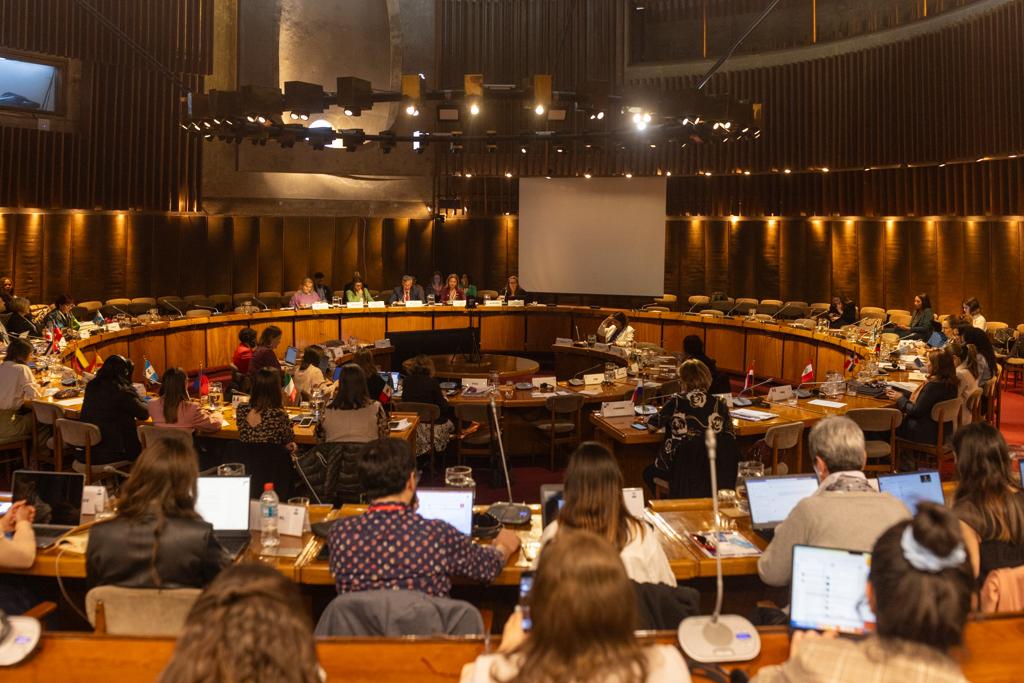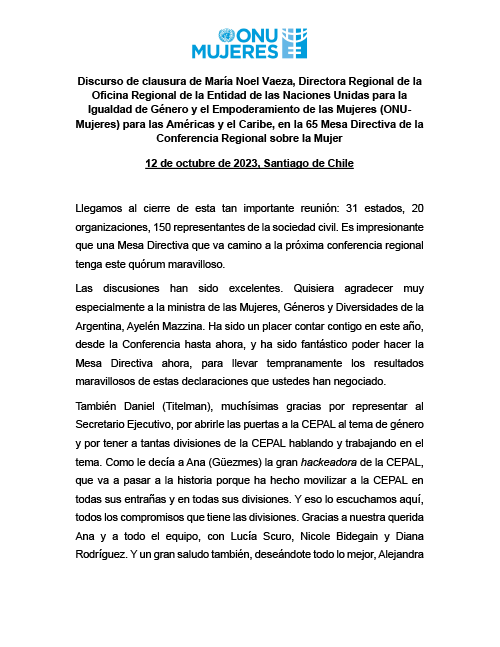The Region’s Countries Agreed to Advance the Care Society to Achieve Gender Equality and a More Productive, Inclusive and Sustainable Future
Today the Sixty-fifth Meeting of the Presiding Officers of the Regional Conference on Women in Latin America and the Caribbean concluded at ECLAC’s headquarters in Santiago.
Date:

Women’s Affairs Ministers and senior authorities from national mechanisms for women’s advancement in Latin America and the Caribbean agreed to advance the care society that proposes ambitious solutions with a sense of urgency, not just to reverse inequality and the feminization of poverty but also to achieve gender equality and women’s autonomy and to attain a more productive, inclusive and sustainable future in the region, during the closing session of the Sixty-fifth Meeting of the Presiding Officers of the Regional Conference on Women in Latin America and the Caribbean.
In the agreements reached at the intergovernmental gathering, the countries adopted “political, economic, social, cultural and environmental transformations as a means of advancing the care society and gender equality” as the central theme to be addressed at the XVI Regional Conference on Women in Latin America and the Caribbean, which will take place in Mexico in 2025.
During the meeting, a special session was held for a regional consultation prior to the 68th session of the Commission on the Status of Women (CSW68), which culminated in the adoption of the Declaration by the Ministers and High-level Authorities of the National Machineries for the Advancement of Women in Latin America and the Caribbean for the CSW68. The priority theme of that session will be “Accelerating the achievement of gender equality and the empowerment of all women and girls by addressing poverty and strengthening institutions and financing with a gender perspective.”
In this Regional Declaration – which is based on the Regional Gender Agenda, and in particular on the recent Buenos Aires Commitment and other intergovernmental agreements adopted in the framework of the Regional Conference on Women in Latin America and the Caribbean – the region’s States “reaffirm the renewed commitment to end poverty in all its forms and dimensions and hunger everywhere, to further promote sustainable development, including inclusive economic growth, protecting the environment and promoting social and financial inclusion, to combat inequalities within and among countries as well as to respect, protect and promote all human rights and fundamental freedoms for all, including the right to development, and to ensure gender equality and the empowerment of all women, adolescents and girls throughout their life course, and peaceful and inclusive societies in which no one is left behind while preserving the planet for future generations.”
The Regional Declaration also reinforces, in line with the Regional Gender Agenda and the Beijing Declaration and Platform for Action, the commitment of States to ensuring that machineries for the advancement of women are afforded the highest level in government hierarchy, supported by the regulatory framework, so that, in executing their functions, they can fulfill their role as the governing and managing bodies of policies on gender equality and women’s rights and autonomy, and ensure that gender equality is mainstreamed throughout the State structure.
Once again, the countries will take Latin America and the Caribbean’s Regional Declaration to the 68th session of the Commission on the Status of Women, which will take place at the United Nations headquarters in New York on March 11-22, 2024.
“In Latin America and the Caribbean, structural inequalities continue to disproportionately affect women, who face ongoing challenges with regard to labor participation, access to resources, the persistence of poverty, high levels of informality and the excess burden of unpaid work and care work. We undoubtedly have the need for a response with a sense of urgency and a responsibility to address economic and fiscal challenges so that gender equality can be an outcome,” Daniel Titelman, Director of ECLAC’s Economic Development Division, said at the meeting’s closing segment on behalf of the United Nations regional organization’s Executive Secretary, José Manuel Salazar-Xirinachs.
“We have the opportunity to build that inspiring future, with and for society as a whole. It is urgent that time, resources, power and work be redistributed in order to move towards a new development pattern based on gender equality and sustainability. The care society is the horizon towards which we invite you to walk,” Titelman stated.
Ayelén Mazzina, Minister for Women, Gender and Diversity of Argentina, in the country’s capacity as Chair of the Presiding Officers of the Regional Conference on Women in Latin America and the Caribbean, indicated: “it is clear that the prevailing development model endangers our economic, social and environmental systems, and has a differential impact on women, adolescents and girls. Our region’s position on the need to accelerate gender equality is also clear.”
The Minister added that “to defend our democracies is to defend the equality, diversity and plurality of our territories. We will continue making progress, as we have done thus far, with more cooperation, with more support and conviction regarding the sustainable development of our countries, with a gender and diversity perspective.”
Meanwhile, María-Noel Vaeza, Regional Director for the Americas and the Caribbean of UN Women, stated that “it is critical that the countries of Latin America and the Caribbean transform and strengthen systems, institutions and financing to eradicate poverty and achieve gender equality. The Regional Declaration adopted by the region’s countries for the CSW68 is an opportunity to continue moving forward on implementation of the Buenos Aires Commitment within the framework of the Regional Gender Agenda.”
These representatives encouraged ECLAC – in coordination with UN Women and the EU-LAC Foundation, and other civil society organizations from both continents as well as with all the governments and organizations committed to this agenda – to keep furthering a biregional pact for care between Latin America and the Caribbean and the European Union with the aim of promoting cooperation on comprehensive care systems and public policies with a gender perspective between countries from both regions, in the framework of implementation of the Buenos Aires Commitment and the European Care Strategy.
At the meeting, the delegates reaffirmed once again the commitment to take all necessary and progressive measures so that States will accelerate the effective implementation of the Beijing Declaration and Platform for Action and the Regional Gender Agenda, strengthening gender equality institutions and architecture and increasing the allocation of financial, technical and human resources, gender budgeting, and monitoring and accountability, with civic participation.
They also reiterated “the call to advance recovery plans with proactive measures to achieve substantive equality that foster comprehensive care systems, decent work and the full, significant and equal participation of women in all their diversity in positions of leadership in strategic sectors of the economy for a transformative recovery with gender equality aimed at the sustainability of life and for the transition to a care society.”
Finally, in the agreements, they again encouraged the governments of Latin America and the Caribbean and of other regions, developed countries, the agencies, funds and programs of the United Nations and other relevant stakeholders to contribute financial resources to ensure the sustainability of the Regional Fund in Support of Women’s and Feminist Organizations and Movements.
The two-day, hybrid meeting was organized by the Economic Commission for Latin America and the Caribbean (ECLAC), as Secretariat of the Conference, in coordination with the United Nations Entity for Gender Equality and the Empowerment of Women (UN Women). It drew the participation of 33 government delegations (20 from Latin America, 11 from the Caribbean, plus Italy and Spain), officials from 21 United Nations System agencies and other intergovernmental organizations, and more than 200 representatives of civil society, mainly from women’s and feminist organizations.
The Regional Conference on Women in Latin America and the Caribbean, which is a subsidiary body of ECLAC, is the main intergovernmental forum on women’s rights and gender equality in the region and has been carried out in coordination with UN Women since 2020.

